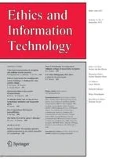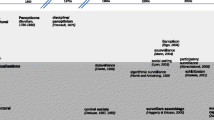Abstract
As users of computer networks have become more active in producing their own electronic records, in the form of transcripts of onlinediscussions, ethicists have attempted to interpret this new situation interms of earlier models of personal data protection. But thistransference results in unprecedented problems for researchers. Thispaper examines some of the central dichotomies and paradoxes in thedebate on research ethics online in the context of the concrete study ofa virtual community that we carried out. We argue that alienation, notprivacy, is the actual core of the ethical problems of virtual communityresearch. While practically everybody is allowed and often welcome tojoin online communities (which undermines the claim to privacy), mostparticipants would agree that members and visitors are not authorized touse, or `harvest,' or sell the product of the group communication. To dothat, they would be expected to ask for permission preferably before thecontent has been produced, thus granting participants' right to controltheir own product. This `non-alienation principle' should be the basisof emergent social conventions in cyberspace. It would apply toresearchers as to anyone else. With certain types of research, wesuggest, cyberspace provides unique opportunities for empoweringsubjects by involving them as contributors in the research project.
Similar content being viewed by others
Bibliography
Christina Allen. What's Wrong with the Golden Rule? Conundrums of Conducting Ethical Research in Cyberspace. The Information Society Journal, 12(2): 175–189, 1996.
Allison Cavanagh. Behaviour in Public: Ethics in Online Ethnography [Online]. Cybersociology. http://www.socio.demon.co.uk/magazine/6/c avanagh.html, 1999 (Viewed on March 29, 2000).
Andrew Feenberg. Alternative Modernity: The Technical Turn in Philosophy and Social Theory. Los Angeles: Univ. of California Press, 1995.
Mark S. Frankel and Sanyin Siang. Ethical and Legal Aspects of Human Subjects Research on the Internet [Online]. www.aaas.org/spp/dspp/sfrl/projects/intres/main.htm, 1999 (Viewed on January 20, 2000).
Erving Goffman. Behavior in Public Places: Notes on the Social Organization of Gatherings. New York: The Free Press, 1963.
Susan Herring. Linguistic and Critical Analysis of Computer-Mediated Communication: Some Ethical and Scholarly Considerations. The Information Society, 12(2): 153–168, 1996.
Hans Jonas. Philosophical Reflections on Experimenting with Human Subjects. Ethical Aspects of Experimentation with Human Subjects. Daedalus: Journal of America Academy of Arts and Sciences, 98(2): 219–247, 1969.
Storm A. King. Researching Internet Communities: Proposed Ethical Guidelines for the Reporting of Results. In The Information Society Journal, 12(2): 119–129, 1996.
Henri Lefebvre. Critique of Everyday Life, Vol.1: Introduction. London, New York: Verso, 1991 (1947).
MediaMOO Symposium The Ethics of Research in Virtual Communities, organized on January 20, 1997. http://www.cc.gatech.edu/ ~ asb/MediaMOO/ethics-symposium-97.html (Viewed on August 15, 1999).
Helen Nissenbaum. Protecting Privacy in an Information Age: The problem of Privacy in Public. Law and Philosophy, 17: 559–596, 1998.
Elizabeth Reid. Informed Consent in the Study of Online Communities: A Reflection on the Effects of Computer-Mediated Social Research. The Information Society, 12(2): 169–175, 1996.
Kate Robson and Mark Robson. Your Place or Mine? Ethics, the Researcher and the Internet. In Armitage, In J. Armitrage and J. Roberts, editors, Exploring Cyber Society: Social, Political, Economic and Cultural Issues, Vol. 2. School of Social, Political and Economic Sciences, University of Northumbria at Newcastle, UK, 1999.
Barbara Sharf. Beyond Netiquette: The Ethics of Doing Naturalistic Discourse Research on the Internet. In S. Jones, editor, Doing Internet Research: Critical Issues and Methods for Examining the Net, pages 243–256. London, New Delhi: Sage, 1999
Jim Thomas, section editor. Special issue: The Ethics of Fair Practices for Collecting Social Science Data in Cyberspace The Information Society, 12(2), 1996.
Dennis Wascul and Mark Douglass. Considering the Electronic Participant: Some Polemical Observations on the Ethics of On-line Research. The Information Society, 12(2): 129–140, 1996.
Author information
Authors and Affiliations
Rights and permissions
About this article
Cite this article
Bakardjieva, M., Feenberg, A. Involving the Virtual Subject. Ethics and Information Technology 2, 233–240 (2000). https://doi.org/10.1023/A:1011454606534
Issue Date:
DOI: https://doi.org/10.1023/A:1011454606534



